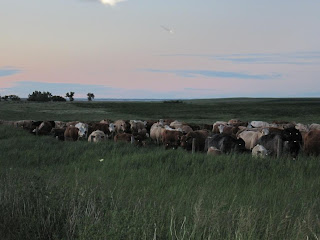Seeing as I live in Saskatchewan, I know that the cold will come, eventually. So far we have been blessed with an unseasonably mild winter. Warmer weather is easier on the animals, no one enjoys -20 weather with wind. But the weather forecast is calling for a change this coming week. -15 to -20 daytime and deep in the -20's at night, with wind chills of -30. BRRRR.
So today we will put out feed for the herd for the coming week. Normally we roll out 4 bales and that lasts 5 days for the 70 goats, 52 sheep, 4 horses and the milk cow. But we will add an extra bale this time, because in really cold conditions the animals can consume up to 20% more.
Ruminants are amazing creatures. Their rumen acts as a giant fermentation vat, and the fermentation generates heat. Instead of feeding grains, we feed more hay. With a warm belly and a spot to hunker down out of the wind, these amazingly hardy creatures do just fine.
It is our empathy that can get us into trouble. Lots of folks will say its too cold! bring them into a barn! The trouble with a barn being that you need good air circulation, or ammonia builds up and that is more damaging to their lungs than fresh, cold air.
There is no barn for deer in nature, they simply know to find a spot out of the wind and wait out the storm.
A barn is a fine thing if one only had say, 2 milk goats and a horse. But everything that is carried in (feed, bedding) needs to be carried out. Feeding 120 small ruminants and the horses and cow inside a barn, would create an enormous pile of bedding and manure. Then one would need a structure that can be cleaned with the use of a skidsteer - to remove the bedding and manure, and spread it on the land where it will fertilize the grass. But lots of the nutrients are lost this way, whereas if the animals are out on the land, they deposit their own fertilizer all over, no need to rent a skidsteer!
Of course, one needs the right kind of animals for ones management style. My goats are acclimatized to being outside. The sheep are range sheep. One could not take a dairy goat that has been living in a barn all its life and kick it out. Careful selection will create a healthy, hardy herd.
I am hoping for some snow with the cold weather. Snow has some insulating value, and adds easily accessible moisture - the animals have a choice to eat snow where they are, instead of walking to water.
And as I bundle up my practically hairless hide to go outside, I marvel at Nature creating fleece to keep the sheep warm.
Your local food source! We are a Holistically Managed small farm, growing ethical, sustainable, natural food. We produce pastured broiler chickens, pastured eggs, pasture raised turkeys, goats and sheep.
Saturday, January 14, 2012
Thursday, January 12, 2012
Exciting times!
A New Year, new possibilities!
I love my life! So much to learn, every day. I always knew that I wanted to farm, somehow, somewhere. Now it is becoming a reality. In 2011 I expanded my goat herd to 70. I got 50 sheep. I look forward to this years kidding and lambing season!
A few images from the past year:
I love my life! So much to learn, every day. I always knew that I wanted to farm, somehow, somewhere. Now it is becoming a reality. In 2011 I expanded my goat herd to 70. I got 50 sheep. I look forward to this years kidding and lambing season!
A few images from the past year:
A Year of Storms:
We had some pretty scary looking clouds, rain, wind, hail, and floods.
Flood water
Chickens
Can you spot the goat in the photo below?
One of my last orphans curled up with the chickens one chilly evening
Chickens enjoying space, sunshine, shade, grass.
We try to raise our animals as ethically, naturally and sustainably as possible.
Custom cows
my boyfriend grazed some 220 custom cattle this summer
Garden
My square foot garden in my back yard, with my chicken coop visible
Sheep and goats
Winter Wonder
Subscribe to:
Comments (Atom)















